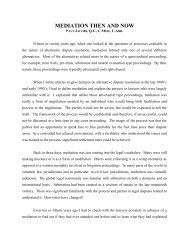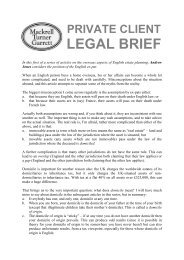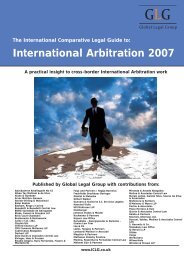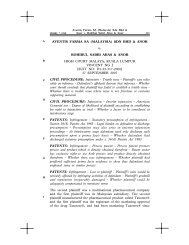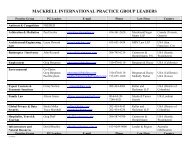Mergers & Acquisitions - Mackrell International
Mergers & Acquisitions - Mackrell International
Mergers & Acquisitions - Mackrell International
You also want an ePaper? Increase the reach of your titles
YUMPU automatically turns print PDFs into web optimized ePapers that Google loves.
®<strong>Mergers</strong> & <strong>Acquisitions</strong>2013in 67 jurisdictions worldwideContributing editor: Casey CogutPublished byGetting the Deal Throughin association with:Aabø-Evensen & Co AdvokatfirmaÆ´LEXArfidea Kadri Sahetapy-Engel Tisnadisastra (AKSET)ASAR – Al Ruwayeh & PartnersBaker Botts LLPBasham, Ringe y CorreaBersay & AssociésBiedeckibizconsult law LLCBonn & SchmittBowman GilfillanBoyanov & CoCareyCasahierro AbogadosColibri Law FirmCorpus Legal PractitionersCosta, Waisberg e Tavares Paes Sociedade de AdvogadosDavid Norman & CoDebarliev, Dameski & Kelesoska Attorneys at LawDivjak, Topić & Bahtijarević Law FirmDLA Piper UkraineEDAS Law BureauELİG Attorneys-at-LawEstudio Trevisán AbogadosFerrere AbogadosFreshfields Bruckhaus DeringerGilbert + TobinGleiss LutzGTG AdvocatesHoet Peláez Castillo & DuqueHomburgerHoxha, Memi & HoxhaIason Skouzos & PartnersJade & Fountain PRC LawyersKettani Law FirmKhaitan & CoKimathi & Partners, Corporate AttorneysKim & ChangLAWINLAWIN Lideika, Petrauskas, Valiūnas ir partneriaiLloreda Camacho & CoMares, Danilescu & AsociatiiMJM LimitedNagashima Ohno & TsunematsuNielsen Nørager Law Firm LLPOdvetniki Šelih & partnerji, o.p., d.o.o.Paul, Weiss, Rifkind, Wharton & GarrisonPellerano & HerreraRentsch LegalRIAALAWSchönherrSimont BraunSimpson Thacher & Bartlett LLPSlaughter and MayStankovic & PartnersStikeman Elliott LLPThanathip & Partners Legal Counsellors LimitedUghi e Nunziante – Studio LegaleWalker Kontos AdvocatesWalkersWeil, Gotshal & MangesWong Beh & TohWongPartnership LLPYoung Conaway Stargatt & Taylor, LLP
contents®<strong>Mergers</strong> &<strong>Acquisitions</strong> 2013Contributing editorCasey CogutSimpson Thacher & Bartlett LLPBusiness development managersAlan LeeGeorge IngledewDan WhiteMarketing managersRachel NurseZosia DemkowiczMarketing assistantsMegan FriedmanCady AtkinsonRobin SynnotJoseph RushAdministrative assistantParween HicksSophie HickeyMarketing manager (subscriptions)Rachel NurseSubscriptions@GettingTheDealThrough.comHead of editorial productionAdam MyersProduction coordinatorLydia GergesSenior production editorJonathan CowieChief subeditorJonathan AllenSubeditorsHarry PhillipsTim BeaverEditor-in-chiefCallum CampbellPublisherRichard Davey<strong>Mergers</strong> & <strong>Acquisitions</strong> 2013Published byLaw Business Research Ltd87 Lancaster RoadLondon, W11 1QQ, UKTel: +44 20 7908 1188Fax: +44 20 7229 6910© Law Business Research Ltd 2013No photocopying: copyright licencesdo not apply.ISSN 1471-1230The information provided in thispublication is general and may not applyin a specific situation. Legal advice shouldalways be sought before taking any legalaction based on the information provided.This information is not intended tocreate, nor does receipt of it constitute, alawyer–client relationship. The publishersand authors accept no responsibility forany acts or omissions contained herein.Although the information provided isaccurate as of May 2013, be advised thatthis is a developing area.Printed and distributed byEncompass Print SolutionsTel: 0844 2480 112LawBusinessResearchGlobal Overview Casey Cogut and Sean Rodgers Simpson Thacher & Bartlett LLP 4EU Overview Stephen Hewes, Richard Thexton and Dan Clarke Freshfields Bruckhaus Deringer 6Albania Shpati Hoxha Hoxha, Memi & Hoxha 8Argentina Pablo Trevisán, Laura Bierzychudek and Walter Beveraggi Estudio Trevisán Abogados 14Australia Neil Pathak and David Clee Gilbert + Tobin 20Austria Christian Herbst Schönherr 28Belgium Sandrine Hirsch and Vanessa Marquette Simont Braun 35Bermuda Peter Martin and Andrew Martin MJM Limited 42Bolivia Carlos Pinto-Meyer and Cristian Bustos Ferrere Abogados 48Brazil Vamilson José Costa, Ivo Waisberg, Antonio de Oliveira Tavares Paes, Jr, Gilberto Gornati andStefan Lourenço de Lima Costa, Waisberg e Tavares Paes Sociedade de Advogados 52Bulgaria Yordan Naydenov, Angel Angelov, Nevena Kostadinova and Gergana Petrova Boyanov & Co 58Canada Richard E Clark and Curtis Cusinato Stikeman Elliott LLP 66Merger Control in Canada Susan Hutton Stikeman Elliott LLP 72Cayman Islands Rob Jackson and Ramesh Maharaj Walkers 75Chile Pablo Iacobelli and Cristián Eyzaguirre Carey 80China Lawrence Guo Jade & Fountain PRC Lawyers 86Colombia Enrique Álvarez, Santiago Gutiérrez and Tomás Calderón-Mejía Lloreda Camacho & Co 92Croatia Damir Topić and Mate Lovrić Divjak, Topić & Bahtijarević Law Firm 100Czech Republic Rudolf Rentsch and Petra Trojanová Rentsch Legal 105Denmark Thomas Weisbjerg, Jakob Mosegaard Larsen andRebecca Vikjær-Andresen Nielsen Nørager Law Firm LLP 112Dominican Republic Marielle Garrigó and Mariangela Pellerano Pellerano & Herrera 118England & Wales Michael Corbett Slaughter and May 121France Sandrine de Sousa and Yves Ardaillou Bersay & Associés 131Georgia Revaz Javelidze and Eka Siradze Colibri Law Firm 137Germany Gerhard Wegen and Christian Cascante Gleiss Lutz 142Ghana Kimathi Kuenyehia, Sr, Atsu Agbemabiase and Kafui Baeta Kimathi & Partners, Corporate Attorneys 150Greece Theodoros Skouzos and Georgia Tsoulou Iason Skouzos & Partners 156Hong Kong John E Lange and Peter Davies Paul, Weiss, Rifkind, Wharton & GarrisonDavid M Norman David Norman & Co 163Hungary David Dederick, László Nagy and Eszter Katona Weil, Gotshal & Manges 169India Rabindra Jhunjhunwala and Bharat Anand Khaitan & Co 175Indonesia Johannes C Sahetapy-Engel and Kartika Putri WohonArfidea Kadri Sahetapy-Engel Tisnadisastra (AKSET) 184Italy Fiorella Federica Alvino Ughi e Nunziante – Studio Legale 191Japan Ryuji Sakai, Kayo Takigawa and Yushi Hegawa Nagashima Ohno & Tsunematsu 197Kazakhstan Saniya Perzadayeva and Aliya Zhumabek Colibri Law Firm 203Kenya Michael Kontos, David Wayumba and Fahreen Alibhai Bid Walker Kontos Advocates 207Korea Jong Koo Park and Sang Hyuk Park Kim & Chang 212
CONTENTSKuwait Ibrahim Sattout and John Cunha ASAR – Al Ruwayeh & Partners 217Kyrgyzstan Zhanyl Abdrakhmanova and Arman Kurmangaliev Colibri Law Firm 222Latvia Raimonds Slaidiņs˘ and Krista Zariņa LAWIN 226Lithuania Robertas Čiočys LAWIN Lideika, Petrauskas, Valiūnas ir partneriai 232Luxembourg Alex Schmitt, Chantal Keereman and Philipp Mössner Bonn & Schmitt 240Macedonia Emilija Kelesoska Sholjakovska and Elena MicevaDebarliev, Dameski & Kelesoska Attorneys at Law 245Malaysia Wong Tat Chung Wong Beh & Toh 251Malta Ian Gauci and Karl Sammut GTG Advocates 257Mexico Daniel Del Río, Jesús Colunga and Amilcar García Basham, Ringe y Correa 263Morocco Nadia Kettani Kettani Law Firm 268Nigeria Theophilus Emuwa, Chinyerugo Ugoji and Ayoyinka Olajide-Awosedo Æ´LEX 274Norway Ole K Aabø-Evensen Aabø-Evensen & Co Advokatfirma 280Pakistan Bilal Shaukat and Naz Toosy RIAALAW 290Peru Percy Castle and Carlos Carrasco Casahierro Abogados 396Poland Ludomir Biedecki and Radosław Biedecki Biedecki 302Romania Simona Mares and Lucian Danilescu Mares, Danilescu & Asociatii 308Russia Igor Akimov and Ilya Lifshits EDAS Law Bureau 315Saudi Arabia O Ali Anekwe and Babul Parikh Baker Botts LLP 319Serbia Nenad Stankovic, Dusan Vukadin and Sara Pendjer Stankovic & Partners 326Singapore Ng Wai King and Mark Choy WongPartnership LLP 333Slovenia Nataša Pipan Nahtigal and Jera Majzelj Odvetniki Šelih & partnerji, o.p., d.o.o. 341South Africa Ezra Davids and David Yuill Bowman Gilfillan 348Switzerland Claude Lambert, Dieter Gericke, Reto Heuberger and Gerald Brei Homburger 354Tajikistan Denis Bagrov and Khujanazar Aslamshoev Colibri Law Firm 362Thailand Issariya Vimonrat and Pitch Benjatikul Thanathip & Partners Legal Counsellors Limited 368Turkey Salih Tunç Lokmanhekim and Elif Çağla Yazdıç ELİG Attorneys-at-Law 371Ukraine Galyna Zagorodniuk and Dmytro Tkachenko DLA Piper Ukraine 380United Arab Emirates Michael Hilton and Mohammad Tbaishat Freshfields Bruckhaus Deringer 385United States Casey Cogut and Sean Rodgers Simpson Thacher & Bartlett LLP 391United States, Delaware Rolin P Bissell and Elena C Norman Young Conaway Stargatt & Taylor, LLP 396Uzbekistan Artem Klimenko and Ravshan Rakhmanov Colibri Law Firm 402Venezuela Jorge Acedo Hoet Peláez Castillo & Duque 407Vietnam Tuan Nguyen, Phong Le, Hanh Bich, Huyen Nguyen, Hai Ha and Thuy Huynh bizconsult law LLC 411Zambia Sharon Sakuwaha Corpus Legal Practitioners 417APPENDIX: <strong>International</strong> Merger Control David E Vann Jr and Ellen L Frye Simpson Thacher & Bartlett LLP 4232 Getting the Deal Through – <strong>Mergers</strong> & <strong>Acquisitions</strong> 2013
izconsult law LLCVietnamVietnamTuan Nguyen, Phong Le, Hanh Bich, Huyen Nguyen, Hai Ha and Thuy Huynhbizconsult law LLC1 Types of transactionHow may businesses combine?The most common forms of business combinations in Vietnam areacquisitions, joint ventures, mergers and consolidations.Generally, an acquisition includes share deals and asset deals.In terms of legal definitions, ‘acquisition’ does not have one commonlegal definition. It is defined across various laws of Vietnam,as follows:• the Law on Investment provides for a partial share transfer orsubscription as one form of direct investment. It is distinctivefrom an ‘acquisition’, which is a complete share transfer;• according to the Law on Competition, the acquisition of anenterprise means the purchase by one enterprise of all or part ofthe assets of another enterprise sufficient to control or govern allbusiness lines or one business line of the acquired enterprise; and• acquisition of a credit institution is, however, differently regulated,being the purchase of all of the assets, rights and obligationsof the target credit institution. After the acquisition, thetarget becomes a subordinate entity of the acquiring entity.An asset transfer, as opposite to a share transfer in the M&A context,is nevertheless not regulated. Asset transfers, including businesstransfers, are usually structured as share transfers whereby the targetbusiness is intentionally separated and transferred to a specialpurposevehicle, the shares of which would then be acquired by theinvestor. An asset transfer could also be straightforward between theseller and the buyer, which includes one or numerous sale and purchasetransactions. An asset transfer is also mentioned in the Law onInvestment through the term ‘project transfer’. The project transfermay be followed by the liquidation of the transferring entity.A merger means a situation where one or more companies ofthe same type (merging companies) may be merged into anothercompany (merged company) by way of transfer of all lawful assets,rights, obligations and interests to the merged company and, at thesame time, termination of the existence of the merging companies.Consolidation means a situation where two or more companiesof the same type (consolidating companies) may be consolidated witheach other to form a new company (consolidated company) by wayof transferring all lawful assets, rights, obligations and interests tothe consolidated company and, at the same time, terminating theexistence of the consolidating companies.2 Statutes and regulationsWhat are the main laws and regulations governing businesscombinations?The Law on Enterprises and the Law on Investment are the two mainlaws generally governing business combinations and applicable to allcompanies incorporated in Vietnam. Specific regulations addressingprivate equity transactions are Decree No. 102/2010/ND-CP, DecreeNo. 01/2010/ND-CP, Decision No. 88/2009/QD-TTg and CircularNo. 131/2010/TT-BTC. If the acquisition involves shares of a publiccompany, the Law on Securities, Decision 55/2009/QD-TTg, DecisionNo. 121/2008/QD-BTC and related rules and regulations willapply. Cross-border transactions will be subject to the Law on ForeignInvestment, the Ordinance on Foreign Exchange and the WTOCommitments. Where an M&A transaction triggers a competitionconcern, the Law on Competition must be observed.3 Governing lawWhat law typically governs the transaction agreements?Generally, the law of the jurisdiction in which the target company isestablished or where the assets for sale are located is selected as thegoverning law of the agreements. The specific law will vary dependingon the particulars of the transaction. The choice of foreign lawrather than Vietnamese law is accepted to the extent that it is notcontrary to the basic principles of Vietnamese law.4 Filings and feesWhich government or stock exchange filings are necessary inconnection with a business combination? Are there stamp taxes orother government fees in connection with completing a businesscombination?M&A transactions involving companies that are active in certainindustries such as banking and finance, aviation or insurance mayrequire approval of their industry regulator. When state-owned assetsor equity are involved, the approval of the relevant state bodies isrequired. In addition, the transaction may have to be conductedthrough a competitive method such as tender or bidding if it involves30 per cent state capital.For acquisitions of public companies, the Law on Securitiesrequires an acquirer who wishes to acquire from 25 per cent of theshares of the target company to file a tender offer application withthe State Securities Commission (SSC). The application comprisesthe registration application, the shareholders’ or board’s resolutionsof the purchaser regarding the tender offer and the shareholders’resolutions of the target in the event it redeems its shares to reduceits charter capital (if any). Upon completion of the tender, the offerormust report to SSC about the tender results within 10 days.In certain circumstances, a business combination involving aVietnamese company may be subject to the reporting requirementsof the Vietnam Competition Authority (VCA). Under the Law onCompetition, if the parties to a business combination have a combinedmarket share of between 30 per cent and 50 per cent of therelevant market they must notify VCA 30 days before the proposedcombination. The proposed combination can only be carried outafter written confirmation has been received from VCA that the combinationis not prohibited. The combination shall be prohibited if thecombined market share is above 50 per cent in the relevant market.www.gettingthedealthrough.com 411
Vietnambizconsult law LLCThere are two exemptions to this rule, such as where one or moreof the parties participating in the economic concentration is or areat risk of being dissolved or of becoming bankrupt; or where theconcentration has the effect of extension of export or contribution tosocio-economic development or to technical and technological progress.These exemptions, however, are not automatically granted.The relevant parties must file to VCA to request for exemption foreconomic concentration.In the case of a merger or consolidation, the investor must complywith the procedures under the Law on Enterprises regarding theliquidation of a company and the formation of a new company. Suchevents must be registered with the business registration authority andthe relevant authorities.If the acquisition results in a shareholder owning more than 5 percent of a public company, then information about such shareholdershall be reported to SSC, the stock exchange where the shares arelisted within seven days as well as being reported to the businessregistration authority.A business combination may require a change to be made to theinvestment certificate or business registration certificate of the targetcompany, or both. A fee of between US$2 and US$10 may be paidto register such change. In addition, the transaction will be subject tovarious Vietnamese taxes depending on the structure of the transactionas further specified in question 18.5 Information to be disclosedWhat information needs to be made public in a businesscombination? Does this depend on what type of structure is used?The information that needs to be made public in a business combinationwill depend on the type of structure used. As mentionedabove, the offeror must file a registration application with the SSCthat contains various information such as the name, address andhistorical business performance of the offeror and its market sharein the relevant business; the name and address of the target; the relationshipbetween the offeror and the target; the current shareholdingsof the offeror in the target; the number of shares to be acquired; theintention of the acquirer post-acquisition with respect to the target’soperation and employees; the sources of capital to fund the acquisition,etc. Upon receiving the approval of the SSC, the offeror mustmake public disclosure of the offer in three consecutive issues of anelectronic newspaper or printed newspaper.Public companies must report a change of 5 per cent or more inthe shareholding of any shareholder holding at least 5 per cent of theshares to the SSC and make a public announcement. Information tobe disclosed includes:• name, address and business lines of corporate shareholders;• full name, age, nationality, place of residence and occupation ofindividual shareholders; and• the number and percentage of shares owned by such shareholders.When there is a merger or consolidation of companies, the companiesmust notify their creditors of the merger or consolidation within15 days from of the merger or consolidation resolution.Furthermore, if the merger or consolidation triggers competitionconcerns then the companies must notify the Vietnam CompetitionAuthority or the Competition Council thereof. Information to bedisclosed includes financial statements of the past two years; a reporton the market share in the relevant market of the parties in the pasttwo years, list of subsidiaries, list of goods and services supplied, etc.6 Disclosure of substantial shareholdingsWhat are the disclosure requirements for owners of largeshareholdings in a company? Are the requirements affected if thecompany is a party to a business combination?A shareholder owning more than 5 per cent of a public companymust report to the SSC, the stock exchange where the shares are listedwithin seven days from the date of acquiring such large shareholdingsas well as being reported to the business registration authority. Wherethere is any material change with respect to the previously reportedinformation or a change in the shareholdings that exceeds 1 per centof the outstanding shares, such shareholder must also report to theSSC and the stock exchange where the shares are listed.7 Duties of directors and controlling shareholdersWhat duties do the directors or managers of a company owe tothe company’s shareholders, creditors and other stakeholders inconnection with a business combination? Do controlling shareholdershave similar duties?Besides the fiduciary duties that the directors and managers of acompany will assume under the Law on Enterprises, they have thefollowing duties.Directors, senior management and large shareholders withknowledge of information about a takeover situation shall not abusesuch information to trade shares for their personal benefit or supplysuch information, encourage or solicit others to trade shares beforethe official public disclosure of the tender offer. In addition, the boardof the target must notify the SSC and its shareholders of its opinionabout the offer to acquire.A business combination is a matter under the shareholders’authority, thus a business combination must be passed by theshareholders in a convened meeting. The chairman of the board isresponsible for convening such meeting pursuant to the proceduresstipulated by law in order to obtain the shareholders’ approval. Specifically,the chairman shall send notice of the meeting, the agendaand documents to the shareholders well in advance of the scheduledmeeting (at least seven working days).The law provides that the contract for a business combinationmust be sent to creditors within 15 days from its being approved. Itdoes not specify persons who are responsible for this but usually it isthe legal representative of the companies. Furthermore, the businesscombination shall be announced to the employees within the abovespecifiedtime limit.Directors and managers must also declare the details of companiesin which they own shares and companies in which their relatedparties own more than 35 per cent of the equity interest. A businesscombination involving either of these companies must be approvedby the shareholders or the board, as the case may be. A party whohas an interest in such transactions cannot vote.A director (general director) of a shareholding company will notbe allowed to concurrently hold the position of director or generaldirector of other companies.Generally the Law on Securities prohibits the following conduct:• directly or indirectly acting fraudulently or cheating, creatingfalse information or omitting essential information that causes aserious misunderstanding and adversely affects a public offering,listing and trading securities, conducting business and investingin securities, securities services and the securities market;• disclosing false information with the aim of persuading or provokingthe purchase and sale of securities, or disclosing incompleteor out-of-date information about events that have a majoreffect on the price of securities on the market;412 Getting the Deal Through – <strong>Mergers</strong> & <strong>Acquisitions</strong> 2013
izconsult law LLCVietnam• using inside information to purchase or sell securities for oneselfor for a third party; disclosing or supplying inside informationor advising another person to purchase or sell securities on thebasis of inside information;• colluding in the purchase and sale of securities aimed at creatinga false supply and demand; trading securities in the form of colludingwith or persuading others to continuously purchase andsell in order to manipulate the price of securities; combining theaforementioned methods or using other trading methods in orderto manipulate the price of securities; or• implementing the securities trading activities without the SSC’sapproval.8 Approval and appraisal rightsWhat approval rights do shareholders have over businesscombinations? Do shareholders have appraisal or similar rights inbusiness combinations?Under the Law on Enterprises, any proposals for the issuance of newshares or disposing of assets of material amounts of the company, ora merger or consolidation shall require the approval of shareholderspresent and voting in person or by proxy representing at least 75 percent of the voting rights.An offer price for shares of a public company must not be lowerthan the average price of the shares published by the stock exchangeduring the 60 days preceding the submission of the offer to the SSCor the average prices of the shares listed by at least two securitiescompanies in the 60 days preceding the submission of the offer tothe SSC.Where a transaction involves state-owned companies, the transactionprice for a strategic investor must not be lower than the averagesuccessful auction prices. Assets of state-owned companies willneed to be appraised in accordance with strict procedures and determinedthrough a competitive method, such as auction or bidding.9 Hostile transactionsWhat are the special considerations for unsolicited transactions?The recently amended Securities Law establishes three situationswhere the investor acquiring voting shares, fund certificates of thepublic company or closed-end fund must tender a general offer toacquire:• if the proposed acquisition results in the investor owning 25 percent or more of voting shares, fund certificates that are issuedand outstanding;• organisations or individuals and related persons holding 25 percent or more of voting shares, fund certificates to purchase 10per cent or more of voting shares or fund certificates, which areissued and outstanding; and• organisations or individuals and related persons holding 25 percent or more of voting shares, certificates of closed-end fund tocontinue the purchase of 5 per cent to less than 10 per cent ofthe voting shares, fund certificates in less than one year after thecompletion of a previous general tender offer.In addition, the amended law provides for six exempted situationsthat are not subject to public offering:• if the proposed acquisition results in the investor owning morethan 25 per cent or more of the newly issued voting shares, fundcertificates according to the issuance plan already passed byGSM of the public company or fund representative board of theclosed-end fund;• if the proposed acquisition results in the investor owning 25per cent or more of the voting shares, fund certificates that arealready approved by GSM of the public company or fund representativeboard of the closed-end fund;• internal transfer of shares between holding company andsubsidiaries;• gift, inheritance or share certificates;• transfer under the court’s decision; and• other transactions as provided by the Ministry of Finance.Generally, the investor must follow the following process in atakeover:• submit a tender offer to the SSC and send a copy to the target;• the target makes an announcement of the offer within three days;• the SSC gives its opinions within seven days;• the board must send its opinions regarding the offer to the SSCand shareholders of the target within 14 days. The board’sopinions must be in writing and signed by two-thirds of theboard members;• the investor must make an announcement in three consecutiveissues of a printed or online newspaper and the website of thestock exchange where the shares are listed, within seven daysfrom its receipt of the SSC’s opinion;• the investor must report the results of the offer to the SSC within10 days from completion of the offer and at the same time makea public announcement on the result of the offer;• the investor must appoint a securities company as an agent conductingthe offer; and• the offer period must be no shorter than 30 days and no longerthan 60 days.It is noted foreign ownership of shares of a public company is cappedat 49 per cent. In addition, where an investor acquires newly issuedshares of a company in a private share placement the investor isrestricted from selling the shares within one year.10 Break-up fees – frustration of additional biddersWhich types of break-up and reverse break-up fees are allowed?What are the limitations on a company’s ability to protect deals fromthird-party bidders?Vietnamese law does not prohibit or otherwise regulate break-upfees and reverse break-up fees. Generally, the parties may agree onthe fees, but the amounts may not be more than 8 per cent of thetransaction value if they are considered as a penalty. Furthermore, theaggrieved party can request for damages for loss. The value of damagesfor loss shall comprise the value of the actual and direct loss thatthe aggrieved party has suffered due to the breach as well as the directprofits the aggrieved party would have earned had such breach notbeen committed. Additionally, though not specifically regulated, thefees should be fully disclosed in the offer document that is registeredwith the SSC and the offer announcement. The break-up fees wouldalso be approved by the shareholders of the target. Where the transactionis between affiliated companies, issues such as transfer pricingand related-party transactions should be considered. If the fees are tobe paid to a foreign party it will raise foreign exchange issue as well.We are not aware of any provisions that prohibit or restrictfinancial assistance in business combinations.Vietnamese law does not place limitations on a company’s abilityto protect deals from third-party bidders. As mentioned above, theboard of the target must send its opinions regarding a takeover offerto the SSC and shareholders within 14 days. The board’s opinionsmust be in writing and signed by two-thirds of the members of theboard. If the board objects to the offer, it is unclear whether the dealcan proceed or be aborted. We note that except for some special circumstances,shareholders are not restricted from selling their shares.www.gettingthedealthrough.com 413
Vietnambizconsult law LLC11 Government influenceOther than through relevant competition regulations, or in specificindustries in which business combinations are regulated, maygovernment agencies influence or restrict the completion of businesscombinations, including for reasons of national security?The Vietnamese government may restrict or bar certain cross-bordertransactions for reasons of national security or public policies ofVietnam.Cross-border M&A transactions shall comply with the commitmentsof Vietnam upon accession to WTO. Transactions involvinga Vietnam-incorporated company active in multiple businesses usuallyrequire appraisals of various line ministries and satisfaction ofnumerous industry specific conditions. Business lines that are notrequired to be to open to foreign investment under the WTO frameworkare subject to the sole discretion of the Vietnamese authorities.Due to the workload in some big cities, a lack of inter-agency coordinationand a lack of implementing regulations in several sectors,these reasons may break deals or delay business combinations insome situations.12 Conditional offersWhat conditions to a tender offer, exchange offer or other form ofbusiness combination are allowed? In a cash acquisition, may thefinancing be conditional?A tender offer must ensure that:• all conditions specified in a tender offer must apply equally to allshareholders in the target company;• the relevant parties can fully access the tender offer information;• the right of the shareholders to sell the shares of the target companyis fully respected; and• the Securities Law is observed.A tender offer must be between 30 and 60 days. A tender offer maybe supplemented or revised with terms no less favourable than thoseof the previous offers.During a tender offer process, the offeror shall not:• directly or indirectly purchase or undertake to purchase the subjectshares of the offer outside the offer tranche;• sell or undertake to sell the subject shares of the offer;• treat shareholders holding the subject shares unfairly; or• supply separate information to a sub-group of shareholders orprovide a different level of information to different groups ofshareholders or at different times.After making a public announcement, the offeror may only withdrawthe offer in the following circumstances:• the total number of shares registered to sell is less than thatintended to be purchased by the offeror as announced;• the target company increases or reduces the number of its votingshares via a share split, share consolidation, or conversion ofpreference shares;• the target company reduces its shareholding capital;• the target company issues additional securities to increase chartercapital; or• the target company sells all or a part of its business or assets.In a cash acquisition, the purchaser must specify in its disclosurereport to the SSC the sources of funds it uses for the acquisition.13 FinancingIf a buyer needs to obtain financing for a transaction, how is this dealtwith in the transaction documents? What are the typical obligations ofthe seller to assist in the buyer’s financing?First, the buyer should provide in the transaction documents the requisiteapproval of the financing entity, this being a condition precedentupon closing of the transaction. Second, the payment schedulemust be commensurate with that of the financing arrangementbetween the buyer and the financing entity. Third, with respect toonshore transactions, the payment should be directed to an indirectinvestment capital Vietnamese dong account opened by the buyerwith a licensed bank in Vietnam, from which the purchase price willbe paid to the seller’s designated account.The Vietnamese authorities require evidence of payment beforean approval is granted. The approval, however, is usually one of theconditions required by the financing entity before the disbursement.This conflict maybe solved in practice in a number of ways, suchas escrow arrangements, payment guarantees or the buyer grantingsecurity over the equity in the target to the seller from the date ofissuance of the approval until the payment of the purchase price.It appears that a Vietnamese-incorporated company is not prohibitedfrom giving financial assistance (directly or indirectly) to thepurchaser in an M&A transaction, such as giving security to thebank loan obtained by the purchaser to finance the acquisition ofshares in itself or its holding company.Vietnamese law is silent on the seller’s obligations to assist thebuyer’s financing in an M&A deal. In practice, the seller may, uponmutually agreement by the parties, assist the buyer in its financing byrecommending some sound financing entities to the buyer or signingnecessary documents relating to the buyer’s financing purposes. Theseller may also give security to the bank loan obtained by the buyer incase the buyer wishes to use the acquired shares or assets as securedassets for the bank loan.14 Minority squeeze-outMay minority stockholders be squeezed out? If so, what steps mustbe taken and what is the time frame for the process?Vietnamese law does not specifically regulate situations where minorityshareholders are squeezed out. Since the law does not require theconsent of all shareholders, a business combination may still occuragainst the will of the minority shareholders. In the case of a mergerwhere it is approved by a supermajority in number representingthree-quarters of the voting rights of the shareholders present or byproxy, the merger plan will be binding on all the shareholders. If themerger plan calls for the transfer of all of the company’s shares, thenthe entire share capital of the company will be transferred to theacquirer (including the shares of any dissenting shareholder). Thereare no regulations specifying the steps to be taken and time frame forthe process in this particular minority squeeze-out.The minority shareholders of a public company are neverthelessprotected in a takeover situation where they can refuse to sell theshares to the offeror or are even entitled to withdraw the subjectshares at any time during the offer process. They also have the putoption to compel the acquirer to buy their shares at the announcedtransaction price if, as a result of the acquisition, the acquirer ownsmore than 80 per cent of the outstanding shares of the target.15 Cross-border transactionsHow are cross-border transactions structured? Do specific laws andregulations apply to cross-border transactions?Cross-border transactions may be structured as an asset or equitydeal.Asset acquisitions usually involve the establishment of a whollyowned entity specifically for the purpose of acquiring the business414 Getting the Deal Through – <strong>Mergers</strong> & <strong>Acquisitions</strong> 2013
izconsult law LLCVietnamand undertaking of the target. Asset deals used to be the preferredchoice due to the complexity and legal loophole of the equity deal.<strong>Acquisitions</strong> of more than 49 per cent in a Vietnamese domesticcompany usually require the conversion of the domestic companyinto a foreign-invested enterprise (FIE). However, if the target companyis undertaking distribution services (wholesale, retail, commissionedagency and franchise), the conversion is still mandatorypursuant to a recent guideline from the Ministry of Industry andTrade. In these circumstances, the parties must follow the proceduresfor establishing an FIE.Equity acquisitions may be onshore transactions whereby theequity of a shareholder in a Vietnamese domestic company or FIE isacquired directly. An onshore equity deal is subject to the approvalof the relevant Vietnamese authorities and governed by the Law onInvestments, Decision No. 88/2009 of the prime minister and itsguiding Circular No. 131/2010/TT-BTC of the Ministry of Finance.Equity transactions may be conducted offshore at the investorlevel, which would involve the sale of the equity of the foreign shareholderin an offshore company. They will usually need to registerthe change in the investor with the Vietnamese authorities. Wherea Vietnamese resident invests in an offshore entity that has beenestablished to make round-trip investments back into Vietnam, theinvestor needs to conduct the offshore investment procedures withrespect to the establishment of such offshore entity and periodicallyreport the offshore investment activities to the competent authoritiesof Vietnam, including subsequent disposal of any equity in it.16 Waiting or notification periodsOther than as set forth in the competition laws, what are the relevantwaiting or notification periods for completing business combinations?For a normal merger:• notify the shareholders of the scheduled meeting regarding amerger at least seven days in advance;• notify creditors of the merger resolution and make a publicannouncement; and• the authorities decide on whether to approve a domestic mergerwithin five working days after receipt of all the required documents.For a merger with a foreign element, the prescribedapproval period is between 15 and 45 working days.For a takeover deal:• the target makes an announcement of the offer within three daysfrom the receipt of the tender documents;• the SSC reviews the tender documents within seven days;• the board must send its opinions regarding the offer to the SSCand the shareholders of the target within 14 days from receipt ofthe tender documents;• the acquirer makes an announcement on three consecutive issuesof a newspaper and the website of the stock exchange where theshares are listed, within seven days from its receipt of the SSC’sopinions;• the length of the offer period is between 30 and 60 days; and• the acquirer reports the results of the tender to the SSC within 10days of completion.Companies in specific industries are subject to industry-specific regulationsthat stipulate different waiting and notification periods forcompleting business combinations. Specific legal advice should besought regarding such mergers.17 Sector-specific rulesAre companies in specific industries subject to additional regulationsand statutes?M&A transactions involving companies in specific industries aresubject to additional and specific regulations and statutes. In principle,approval is usually required before a business combination mayproceed. Foreign equity in certain industries is capped (for example,at 30 per cent for banking) or subject to industry-specific approvals(namely, distribution services), or both.Transactions between credit institutions established and operatingin Vietnam are currently governed by Circular 04/2010/TT-NHNN, which allows various forms of credit institutions to bemerged or consolidated with one bank. There is one form of acquisitionthat is defined as the purchase of the entire legal assets, rights,obligations and interests of the target credit institution. After theacquisition, the target credit institution becomes a subsidiary companyof the acquiring institution. The acquisition requires consentof the State Bank.Specifically in regard to distribution services, there has been concernthat the requirement of economic need test (ENT), which isonly required for any retail sales outlet outside the first one, mightbe applied retroactively to an existing chain of retail sales outletsof domestic enterprises in the case of capital assignment to foreigninvestors.Business combination in certain investment sectors requiresapproval of the relevant authorities at ministerial level. Opinions ofthose central ministries have considerable impact and can determinewhether the business combination can be approved.18 Tax issuesWhat are the basic tax issues involved in business combinations?The tax treatment will depend on the structure of the transactionand legal status of the seller. If the seller is a legal person, corporateincome tax at 25 per cent will be levied on the capital gains generatedfrom the transfer of assets. The tax base would be the actualsales price less the cost of acquiring the assets and direct expensesof transferring such assets. In addition, an asset transaction will besubject to VAT ranging from 0 per cent up to 10 per cent. In the caseof transfer of certain property such as real estate or vehicles, thetransaction will be also subject to a property registration tax from0.5 per cent to 20 per cent. The rate of 25 per cent will also apply inthe case of a share transfer.Where the seller is a natural person, the personal income tax isusually levied on profit derived from the transfer of shares. For unlistedshares, the tax rate is 20 per cent of the income. For listed shares, therewill be two options: 0.1 per cent of the transaction value or 20 per centof the net annual income from investment in the listed shares.Furthermore, special adjustment rules that govern transfer pricingmay apply if the transaction involves affiliated parties. The partiesmay also take advantage of various double taxation agreementsthat Vietnam has entered into with other countries in cross-bordertransactions involving Vietnam-incorporated companies.19 Labour and employee benefitsWhat is the basic regulatory framework governing labour and employeebenefits in a business combination?Under the Labour Code, where an enterprise undergoes restructuringthe succeeding employer is responsible for continuing the performanceof the labour contracts with the employees. For thoseemployees who have been working for the company for a period ofone or more years and become unemployed, the new employer mustre-train and assign the employees to other jobs within the enterprise.Where they cannot employ all of the existing employees, the employmentplan must be worked out with the participation of the tradewww.gettingthedealthrough.com 415
Vietnambizconsult law LLCunion representatives and its implementation must be notified to thelocal labour authority. If termination of employees is necessary, theemployer needs to publish a list of the employees to be retrenched, toconsult the trade union and to notify the local labour authority. Theretrenchment shall be conducted gradually. In the event they cannotreach agreement with the trade union on this matter, they would bepermitted to terminate the employees only after 30 days of givingsuch notice to the local labour authority.An employee who has been serving for 12 months or more mustbe paid compensation for loss of work based on their seniority, whichis equivalent to an aggregate amount of one month’s wages for eachyear of employment, but no less than two months’ wages.20 Restructuring, bankruptcy or receivershipWhat are the special considerations for business combinationsinvolving a target company that is in bankruptcy or receivership orengaged in a similar restructuring?Bankrupt companies are subject to the Bankruptcy Law, which tookeffect on 15 October 2004. The Bankruptcy Law applies to all entitiesin Vietnam that have legal person status. There are special provisionsapplicable to companies in the financial sector such as banking,securities or insurance. In these circumstances, the State Bank, theMinistry of Finance or the State Securities Commission, as the casemaybe, shall have the right to apply available methods to restore thepayment ability of the bankrupt companies upon receiving a noticefrom the court on initiation of the bankruptcy proceedings.Where there is a decision to start the bankruptcy procedures,the Bankruptcy Law does not allow a bankrupt company to sell orexchange its shares or transfer its property without the prior writtenconsent of the presiding judges.Certain transactions entered into by a bankrupt companywithin three months prior to the court accepting a bankruptcyapplication may be invalid, such as where the bankrupt companyhas donated its property, paid undue debts, mortgaged orpledged property for debts or carried out other transactions aimingto disperse its property. In addition, during the bankruptcyproceedings, if it is deemed that a suspension of the performanceof valid contracts that are being performed or have not yet beenperformed will be more beneficial for the bankrupt company,the performance of such contracts shall be suspended. Therefore,investors dealing with such entities should take care to ensurethat their dealings are conducted in a manner that will not exposethem to the risk of a transaction being suspended or terminated.21 Anti-corruption and sanctionsWhat are the anti-corruption, anti-bribery and economic sanctionsconsiderations in connection with business combinations?The Law on Anti-corruption of Vietnam does not refer to businesscombinations.A fine of from 5 to 10 per cent of the total revenue in the financialyear prior to the year in which a breach of the provisions of businesscombinations was committed shall be imposed on an enterprisecarrying out a prohibited merger, consolidation, acquisition or jointventure, as stipulated in the Law on Competition.A fine of from 1 to 3 per cent of the total revenue in the financialyear prior to the year in which the breach was committed shall applyto an economic concentration that was not notified as required bylaw.Tuan NguyenPhong Letuan.na@bizconsult-vietnam.comphong.lh@bizconsult-vietnam.comHead office:Branch office:3rd Floor, 20 Tran Hung Dao Street17th Floor, Saigon Riverside Office CenterHanoi 2A-4A Ton Duc Thang, District 1VietnamHo Chi Minh City, VietnamTel: +84 4 3933 2129 Tel: +84 8 3910 6556Fax: +84 4 3933 2130 Fax: +84 8 3910 6560www.bizconsult-vietnam.com416 Getting the Deal Through – <strong>Mergers</strong> & <strong>Acquisitions</strong> 2013
®Annual volumes published on:Annual volumes published on:Acquisition FinanceAir TransportAnti-Corruption RegulationAnti-Money LaunderingArbitrationBanking RegulationCartel RegulationClimate RegulationConstructionCopyrightCorporate GovernanceCorporate ImmigrationData Protection & PrivacyDispute ResolutionDominancee-CommerceElectricity RegulationEnforcement of ForeignJudgmentsEnvironmentForeign Investment ReviewFranchiseGas RegulationInsurance & ReinsuranceIntellectual Property &AntitrustLabour & EmploymentLicensingLife SciencesMerger Control<strong>Mergers</strong> & <strong>Acquisitions</strong>MiningOil RegulationOutsourcingPatentsPharmaceutical AntitrustPrivate Antitrust LitigationPrivate EquityProduct LiabilityProduct RecallProject FinancePublic ProcurementReal EstateRestructuring & InsolvencyRight of PublicitySecurities FinanceShipbuildingShippingTax on Inbound InvestmentTelecoms and MediaTrademarksTrade & CustomsVertical AgreementsFor more information or topurchase For more books, information please or to visit:www.GettingTheDealThrough.compurchase books, please visit:www.GettingTheDealThrough.comStrategic research partners ofthe ABA <strong>International</strong> sectionThe Official Research Partner ofthe <strong>International</strong> Bar Association<strong>Mergers</strong> & <strong>Acquisitions</strong> 2013 issn 1471-1230






